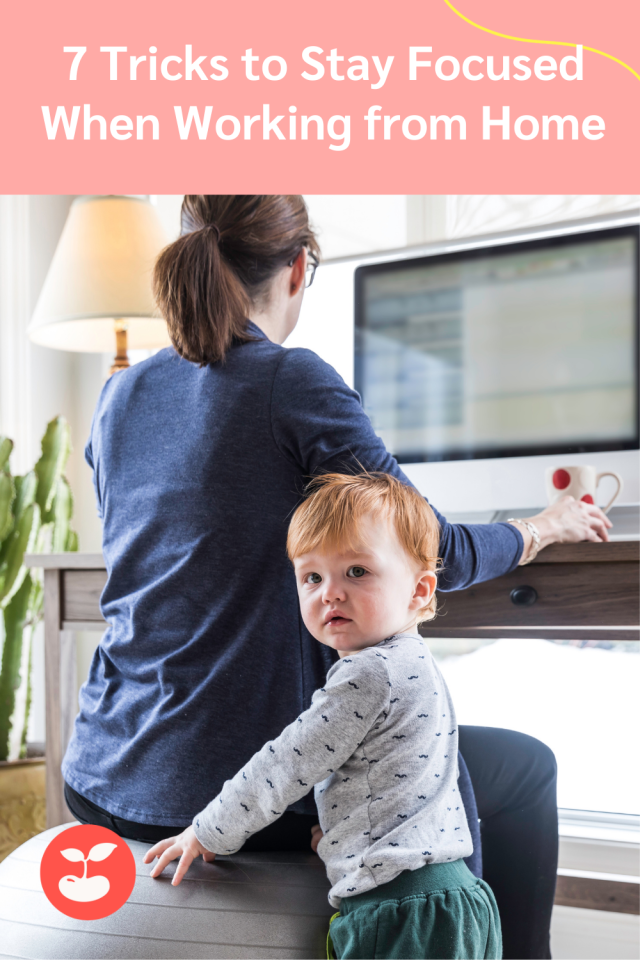
Our current work culture where “everyone is available all the time” is causing exhaustion across the workforce. But there is an added layer of difficulty for parents that are, on top of work requirements, always feeling the pull of the biggest job of all, parenting. One “solution” that people turn to is working from home. And it is true, there are some very real and good advantages to that, but anyone that works from home will also tell you, it is kind of a circus.
Remember the Margo and James incident? A lot of people working at home are seeking more balance, but let’s get something straight, this is not the magic solution. I have been a work at home parent for over 12 years and some days I just wish I went to an office. After experiencing weaving work into my day with babies, toddlers, and teens, I can confirm one of the biggest challenges is that your landscape is constantly changing. You have to reassess your work structure all the time. What happens when that toddler gives up their second nap? Or how do you restructure your day to help with homework after school and still take work calls?
It is important to acknowledge that there are different types of work at home jobs there are people that are working their job remotely but still with a very typical daily structure. These tips are most relevant for people who have full control over their work schedules and weave their work and home timelines together a bit more.
- Establish “Do Not Disturb” Time: At the beginning of every week take the time to build out your week. This establishes “do not disturb” time or hours that are protected (by you) for work. What you will find when you work at home and have kids, is that almost no two weeks are the same. There is always some wild card item (doc appt., meeting, school event) that changes the landscape of your week. If you know you need to work 20 hours this week then look at the next 5 days, mark off the time you know you can NOT work, now schedule in your working blocks. And most important of all, protect them.
- Frame Your Week: If there are items in your work that are repeated often or consistent habits you want to build, then create a framework for that in the week. For example, I send out a weekly newsletter with three interesting items (articles, podcasts, videos, etc) and a couple of my own comments on each. I send it out every Thursday. In order to do this, I keep an excel spreadsheet that I use to track all the content I have read, listened to, or watched. I put a few notes in there and it becomes my brain dump. Then when Thursday rolls around I just compile this info, edit it and push it out. I have a personal challenge to not miss a week unless it is scheduled in advance. The longer I go with this “no week off” the more momentum I feel behind it.
- Determine the Best Time for Tasks: Not all work is created equal. There is certain work you do that is more impactful while other items are just tasks that need to be accomplished, but don’t hold as much weight. There is work you will do that will pull on your mind and focus more than other work. Depending on your personal bio-rhythm and your current parenting circumstances you need to determine when you are at your best. This is one of the advantages of working from home. You can design your day to take advantage of your strongest times. Personally, I have trained myself to become an early riser. Anything that requires focus and thought (writing, designing) I tackle early in the day. As the day goes on I grow more tired and more easily distracted. I try and schedule phone calls for the afternoon when I hit a lull in the day. I am an extrovert with a strong introvert streak, I do gain energy from others, so when I need energy it is good for me to connect with other people.
- Do Not Multitask But Layer Appropriately: One of the biggest lies we are told is that women are better multitaskers. I think this label came from our seemingly inherent ability to hear a baby crying in the other room, while on the phone, and making dinner. In fact, to me, this “feature” can be more overwhelming. I have trouble shutting out the world around me because my brain seems to engage in everything regardless of whether I want to or not. When you sit down to accomplish focused work do NOT try and multitask. Focus on one thing at a time. It is hard, you sit down to write and all the sudden you need to check or email or pay your cell phone bill. Those are distractions. While I don’t like multi-tasking, I am a fan layering time. Use the time that you are spending doing mindless work (dishes, folding, driving) to study. There is certainly always room for continuing education, use this time to try and feed your mind with things like audiobooks or podcasts.
- Get Help: If you have young kids at home you might feel guilty asking someone to come into your house to help with the kids. Especially if you are not financially contributing a lot, you may feel like it is not fair to spend money having someone else help with the kids. Don’t fight this, if it is at all possible schedule some time when you can fully focus on your work. You will get 10 times more done when you are working within these constraints. Work tends to expand to the amount of time we give it. Hiring someone to help you with enforcing some time-blocking. It will also allow you to shift your attention fully to your kids after those hours.
- Turn Off Notifications: There are many, many articles written about how distracted we have become. If you are on a limited timeline working from home, you can not afford to react to every notification you get. You can turn on “do not disturb” mode on your computer and devices. If you are like me and worried you will miss an important call from your kid’s school or your spouse you can set it up where those are the only numbers that get through. In addition, turn off all the notifications that pop up on your phone from Facebook, Instagram, and email.
- Leave the Dishes: Do not underestimate this piece of advice. This is one of the biggest issues with working from home. There are always chores that need to be done. It is true that working at your house allows you to do a few things that you couldn’t do during the day (like throw in that load of laundry), but if you need to have your house in a perfect state you are never going to get anything done. The thing is, those dishes will still be there when your tasks for the day are complete.
These seven points of advice are much easier said than done. I constantly fight hard to follow these rules. As soon as I wrote the work laundry I remembered I need to put a load in and almost got up to do so. Fight against the distraction, if you are really focused for a short period of time, you will accomplish just as much (if not more) then spending three times as long but jumping between tasks.












